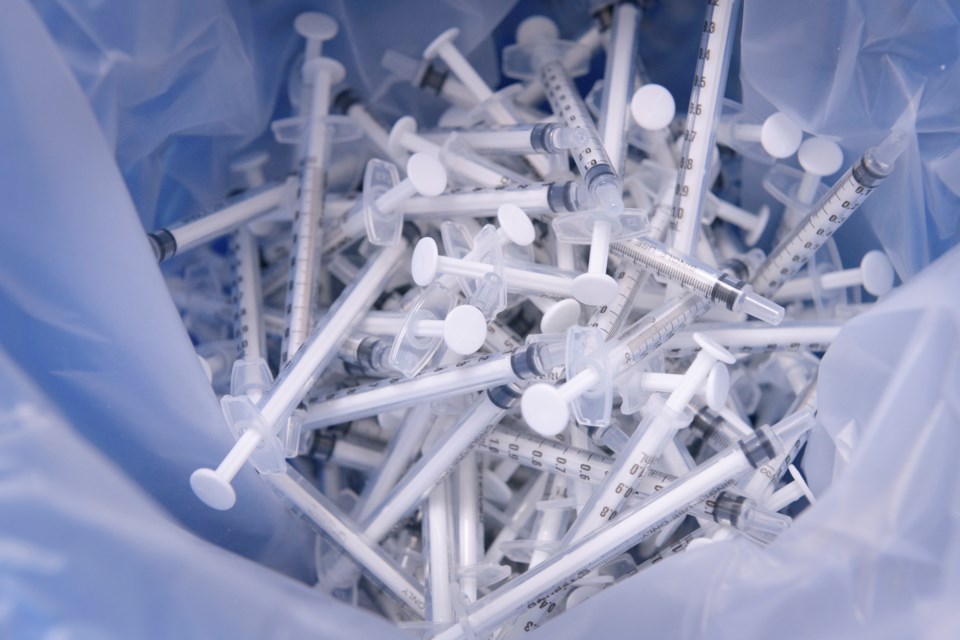The City of Vancouver has set up over 200 sharps boxes at public pools, rinks and rec centres since 2017, but there is still a shortage of them in public park washrooms, let alone public washrooms themselves, according to homeless blogger Stanley Woodvine.
The Vancouver Park Board assured that "sharps containers are installed within our park washrooms," in an email to Vancouver Is Awesome, adding that, despite some needle waste containers being periodically vandalized or stolen, park washrooms are checked twice a day and each visit includes clean up of needles and reports of missing or damaged sharps boxes. On-demand services like PHS' Mobile Needle Exchange Van are contracted by the city to empty full needle containers.
While this may be the case closer to downtown Vancouver and in the Downtown Eastside (DTES), Woodvine resides in Fairview among with a homeless population that is just as high.
In Woodvine's experience, sharps boxes are scarce regardless of which building they are in. "I've only been homeless for 18 years. But in that time, I have never seen a sharps box in Fairview. Now there's a sharps box at the public library branch [but] that's inside- I've never seen one outside, in an alley or anything like that. It's just never been a thing on the west side."
Where needles come from
He explains that people who inject drugs typically avoid public spaces, opting for alleys, dumpsters and behind BC Hydro Boxes. Woodvine adds that the 28 outdoor sharps boxes located in DTES alleys and facilities have "measurably cut down needle waste," he says, suggesting the similar need in Fairview.
According to Woodvine, the homeless population on the city's west side, though just as large as that in the DTES, is less visible, which may be a contributing factor to the shortage of sharps boxes. "Part of the city's general attitude is that there really aren't homeless people on the west side," he says.
"What actually is true about homeless people in Fairview and Kitsilano, is that they don't sit around. There aren't really places for them to sit around. They tend to be much more busy and active and going through the alleys and binning and doing things and going from place to place. [It's hard] to bring outreach into this area, compared to the Downtown Eastside where you can park somewhere and there are going to be [homeless] people within a block of you," he explains.
Woodvine has taken note of the twice-a-day public park washroom checks done by city custodians, observing that collecting needles and setting up more sharps boxes at park washrooms "seems like a natural place to do it."
Needles affect everyone
Though needles are often used for drug injection, there are other reasons for individuals to use needles. "The same syringes that people are using to inject street drugs are the same as syringes that people are using when they are self-injecting insulin," Woodvine says. Safe disposal of needles is more than a drug-related need, and ties into harm-reduction that affects all residents.
"Say I go into a public washroom and there's a syringe on the counter," says Woodvine. "I think that the person who's left it there [did] everybody else a favor by leaving it right out in the open. I'd much rather that they did it there [than if] they dropped it in the garbage," he explains, alluding to the need for sharps boxes.
Keeping needles out of the garbage stream prevents the risk of unexpected harm to other residents, including staff who are just doing their job and, as Woodvine describes as an example, pushing down paper into garbage bags. "They're not thinking that they have to treat it like hazmat waste."
It's evident that needles don't belong in the garbage, just as food waste should be separate from recycling. "But just saying that people shouldn't throw them in the garbage isn't really a good answer, because then where do you want them to put them?" points out Woodvine.
"If we can do a bylaw that requires restaurants to charge a quarter for a paper cup which a customer actually uses to drink coffee out of then we can do bylaw that requires the same restaurants to put sharps boxes in their washrooms," proposes Woodvine. "It's less common for me to find a syringe in a park washroom in Fairview, on the west side of Vancouver, than it is for me to find a syringe in a public restaurant like McDonald's or a coffee shop [like] Tim Hortons."
More public washrooms
Woodvine broadened the subject by pointing out the overall lack of public washrooms on the west side overall, and why they are so important to have.
"If you stand by a park washroom for, say, an hour or two hours, you're going to see a stream of residents coming in using that washroom who are not homeless people. They're going to be construction workers. They're going to be joggers, elderly people, lots and lots of people walking their dogs. Lots of people use those washrooms. And the same is true of restaurant washrooms."
When it comes to Vancouver's west side, Woodvine hopes to see more sharps boxes and more public washrooms, even if the need for it may seem invisible.


